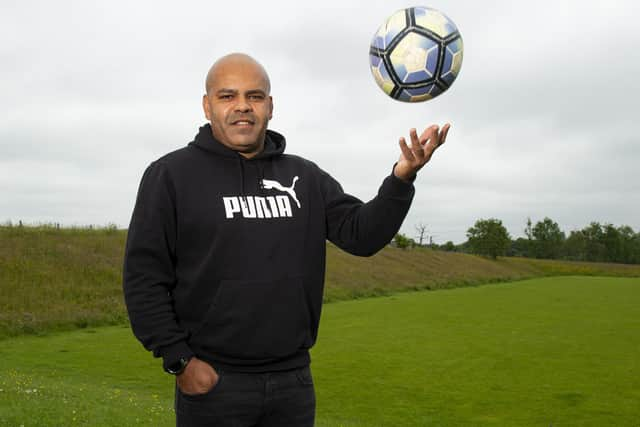Kevin Harper explains role as Hibs scout two months after returning to Easter Road
and live on Freeview channel 276
The former winger started his career at Easter Road after being spotted by Alex Miller while playing for Hutchison Vale. He spent six years in the first team before making a 1998 switch to Derby County for £300,000 a month into the First Division season following the club’s relegation the campaign prior.
After a playing career that also saw him play for Portsmouth, Stoke City and Dunfermline Athletic, he went into coaching, eventually landing the Albion Rovers job in 2018, becoming the first black manager in the SPFL in the process.
Advertisement
Hide AdAdvertisement
Hide AdFollowing his exit from Cliftonhill in 2020, Harper started doing some hospitality work for Hibs. This ultimately led to his return in April after he sufficiently impressed CEO Ben Kensell, head of recruitment Ian Gordon and former manager Shaun Maloney in a series of meetings after bumping into Kensell one matchday afternoon at Easter Road.


Speaking to the the official Hibs podcast, The Hibee Buzz, Harper stated his pleasure at being back where it all started as he explained his role at the club in detail.
He said: "I’m absolutely delighted to be back involved with the club. It’s always been a club that’s been very close to my heart.
“My role is about doing lots of research, watching lots of games. There’s a bit of pressure on it because you need to ultimately say whether you think a player is good enough. Then it’s up to the head of recruitment to pass it on to the manager. Then the manager takes it under advisement.
Advertisement
Hide AdAdvertisement
Hide Ad“The key thing is taking yourself out of all the hype about what you’ve heard of them, whether positive or negative.
“Ultimately the manager isn’t just going to buy a player on my say so, but it could be the difference between him saying ‘yeah, I’d like more information’ or just saying no. And if the player he says no about two months later becomes a superstar, he’s going to point the finger at me and ask what I was thinking.
“There’s lots of different elements to take into consideration. Were they playing at home? Were they playing away? Were they shouting at team-mates? Were team-mates shouting at them? Were the fans getting on at them? Is the manager giving them specific instructions? Will they chase back? When there’s the opportunity can they create or can they stop the opposition? There’s lots of different aspects that you have to be aware of when you watch the game.
"You’re not going to see the player just once. You’re going to watch them three, four, five, maybe even six times. You’ll make your report and then somebody else will probably go and see them. Then the manager or assistant or both of them will go. Because I can’t think that a club would buy a player based on one scouting report. That would be kamikaze stuff.
Advertisement
Hide AdAdvertisement
Hide Ad"Ultimately that’s the role. You have to be a benefit to the club.”
Message from the editor
Thank you for reading this article. If you haven't already, please consider supporting our sports coverage with a digital sports subscription.
Comment Guidelines
National World encourages reader discussion on our stories. User feedback, insights and back-and-forth exchanges add a rich layer of context to reporting. Please review our Community Guidelines before commenting.